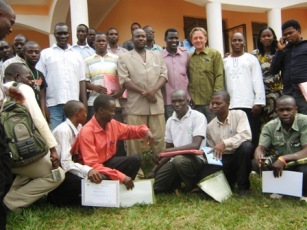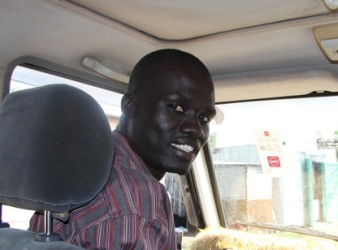W. Equatoria assures journalists of press freedom
March 8, 2011 (YAMBIO) – The state minister of information and communications of Western Equatoria Gibson Bullen Wande has told journalists in the state that the current government has no restrictions on media coverage.

South Sudan’s secession vote was held in January as part of a peace deal that ended decades of conflict. Since the agreement the former rebels who now govern the South, the SPLM, and the Khartoum based National Congress Party have shared power.
The facilitator of the workshop Perez Vinther from IMS disclosed that “International Media Support will continue to build the capacity of the journalists in the new born country.” He urged the state minister of information to provide freedom of press in the state to allow the local journalists exercise their work freely.
Meanwhile the minister pointed out that most politicians in South Sudan still “do not acknowledge the power of [the] media, making it hard for journalists to perform their normal duties. “Journalism in Sudan is like bread and butter, which needs the essence of commitment of [the] individual journalist”, he added.
The minister encouraged female journalists to pursue and attain lots of training in journalism citing that “female journalists are always persistence in work.”
He stated that commitment matters in journalism in order to provide adequate, balanced and accurate information to the public.
“With birth of the 54th nation in Africa, the local journalists on [the] ground are to be prepared and be ready to portray the image of the new nation”, he noted.
Wande assured local journalists that the ministry of information and communication will build a centre for training by the ministry and development partners.
Over 32 local journalists from across the state benefited from the three-day training and were awarded with certificates of attendance. Similar trainings were also conducted by NPA in Wau, Kwajok, Juba and Malakal.
Censorship and repression of the media in northern Sudan is common, with broadcast media controlled by the Khartoum government and independent newspapers often taken out of circulation and their journalists arrested. The UN’s radio station Miraya FM is not allowed to broadcast in the North, whereas it is allowed to broadcast in South Sudan.
Press Freedom in South Sudan
However, according to the Committee to Protect Journalists (CPJ) Sudan report for 2010 the SPLM who control the South have also harassed journalists:
In March, security officers in the southern state of Central Equatoria raided two local radio stations, temporarily forced them to stop broadcasting, and detained staff. The raid on Liberty FM was apparently prompted by an interview with an independent state gubernatorial candidate who was challenging the SPLM ticket. Security agents did not explain their decision to raid the Roman Catholic-run Bakhita Radio and arrest its manager, a nun. However, the station was warned to stay away from politics and broadcast only religious programs, according to news reports. Both stations said their staff members were later released and that they resumed broadcasting the same day.
The press freedom watchdog said that in May 2010 that, ‘a minister in the southern government criticized Miraya FM for airing an interview with George Athor’. Athor is a dissident SPLM commander who at the time was threatening to launch a rebellion after losing in regional elections. Since May 2010 his forces have clashed several times with the South Sudan army (SPLA) and have been accused of massacring civilians in Jonglei state.
CPJ reported that: ‘Some local journalists expressed disapproval of the minister’s statements, saying they pointed to political intolerance.’
Mayang Mayom
In August Sudan Tribune journalist Manyang Mayom was awarded for his ‘commitment to free expression and courage in the face of political persecution’ with a Hellman/Hammett grant by Human Rights Watch on August 4.

In December 2007 Mayom left his job as a senior radio reporter southern Sudanese Radio Rumbek FM 98 and began working as a freelance journalist. It was after he left the government broadcaster he says that he began to be harassed by the southern security services and the Sudan People’s Liberation Army, the former rebels who have governed southern Sudan as an autonomous region since a peace deal in 2005.
In February 2008, Mayom was badly beaten by a militia loyal to Paulino Matip, the second in command of the Southern army (SPLA) whose soldiers had merged with the SPLA the previous year. The incident occurred in the Rumbek the capital of Lakes state, while Mayom was investigating a civilian disarmament campaign being conducted by the SPLA.
Mayom’s injuries were so bad that he was taken to the Sudanese capital Khartoum for treatment. When he became aware of his award in August 2010, over two years after the attack, Mayom was again visiting Khartoum for further treatment to his kidneys, which still cause him pain and do not function properly.
In 2009 security services in Lakes state tried to force him to leave Sudan accusing him of giving the region a bad international reputation from his reporting.
During his time reporting in Lakes state he has been accused of being both a spy for the Khartoum government and an agent of the International Criminal Court by local security services. Mayom said in August 2010 that access to media and freedom of press in Lakes state is very poor.
Rumbek is a difficult place to work as a journalist, he says, because in many ways it is still the headquarters of the SPLA, as it was during the 22 year civil war, despite Juba being the official regional capital.
(ST)
For more information of press freedom in Sudan see Sudan Tribune’s Press Freedom section as well as the Sudan country profiles published by Reporters Without Borders and CPJ.

Dinka Dominated SPLA
W. Equatoria assures journalists of press freedom
God for you Western equatoian gov But my massage gose to those journalists is If you’ve got a big mouth and you’re controversial, you’re going to get attention and this where the Gov and madia got in to difference. beacuse some of them have poor thinking capability to know what to report and whan they can’t.
But goodluck with your freedom and make ssure not to cross redline. thanks